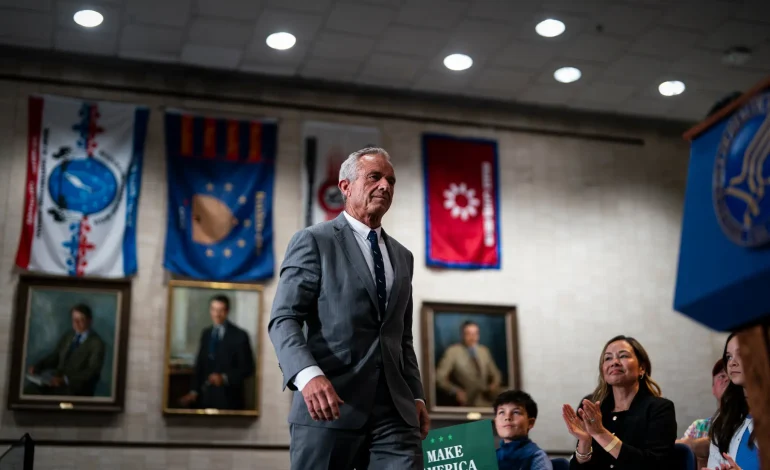Health Secretary Robert F. Kennedy Jr. intensified his public health campaign on Tuesday with a strong critique of the food industry, labeling sugar as “poison” and unveiling plans to eliminate petroleum-based food dyes from consumer products by 2026, the New York Times reports.
Speaking at a news conference in the Department of Health and Human Services’ grand hall, Kennedy said he had reached a preliminary “understanding” with major food manufacturers to remove artificial coloring agents. However, no representatives from the food industry attended the event, and no company has formally agreed to the proposed changes. One exception is the International Dairy Foods Association, which has committed to phasing out artificial colors in dairy products served in schools by the 2026 school year.
While specifics of any agreements remain unclear, Kennedy and his advisers claimed that many food manufacturers and fast-food chains have contacted the agency for guidance.
“Four years from now, we are going to have most of these products off the market, or you will know about them when you go to the grocery store,” Kennedy stated.
This move marks Kennedy’s first sweeping attempt at reforming the food industry, which he has frequently criticized for promoting ultra-processed foods linked to obesity, diabetes, and heart disease. His comments on sugar were particularly pointed, arguing that excessive consumption is both harmful and addictive — especially among children. He challenged current dietary guidelines and stated:
“Sugar is poison, and Americans need to know that it’s poison.”
The Food and Drug Administration currently recommends that added sugars make up no more than 10% of daily caloric intake for both adults and children.
Despite the ambitious scope of his reform agenda, Kennedy’s critics have raised concerns over his simultaneous budget and personnel cuts at key public health agencies, including the FDA and National Institutes of Health (NIH). Detractors argue that these reductions may undermine efforts to police the food industry effectively.
Notable resignations have followed in recent weeks. Kevin Hall, a leading nutrition scientist at the NIH, resigned over concerns about censorship. Jim Jones, the former head of the FDA’s food division, also stepped down, calling recent staff cuts “indiscriminate” and warning that his ability to implement meaningful change had become “fruitless.”
Nonetheless, Kennedy presented a united front with supporters during the announcement. He was joined by Dr. Marty Makary, the current FDA commissioner; Dr. Jay Bhattacharya, head of the NIH; and several Republican governors aligned with his “Make America Healthy Again” (MAHA) initiative. MAHA Moms, a group advocating for food safety reforms, also appeared alongside their children to support the secretary’s vision.
Dr. Makary expressed optimism that collaboration with the food industry could lead to progress without imposing new regulations.
“You win more bees with honey than fire,” he said. “I believe in love, and let’s start in a friendly way and see if we can do this without any statutory or regulatory changes.”










The latest news in your social feeds
Subscribe to our social media platforms to stay tuned